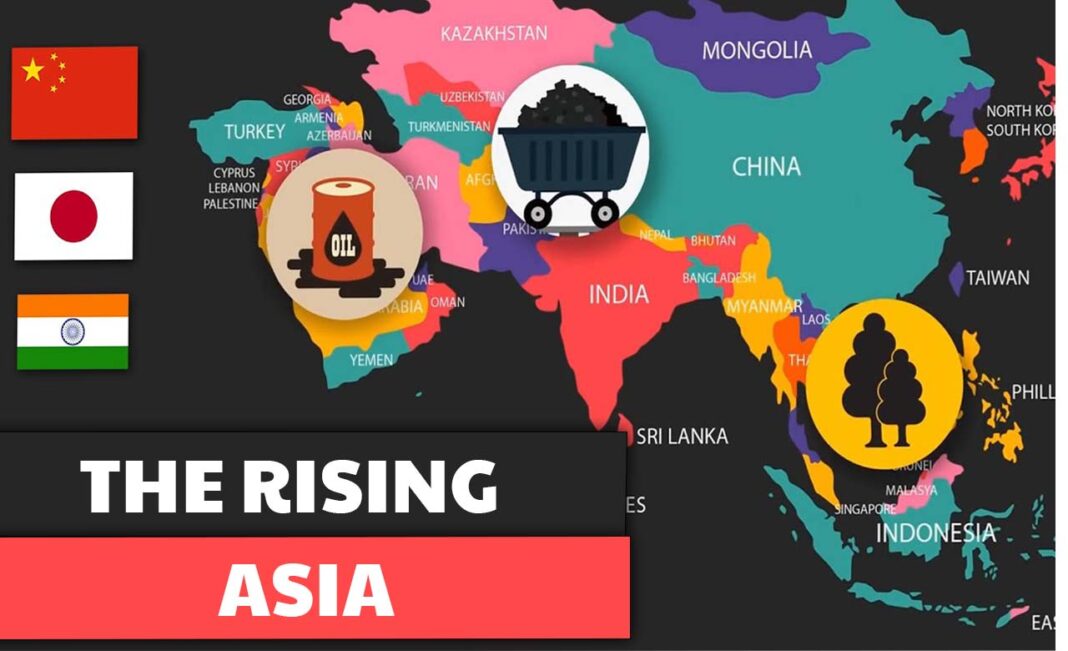In recent years, Asia has emerged as a rising power in the world, challenging the dominance of the West and shifting the balance of power in global politics and economics. This new era of Asian power has been driven by the economic growth and development of countries like China, India, Japan, South Korea, and others, who have been able to capitalize on their resources, human capital, and strategic locations to become key players on the world stage. This article examines the rise of Asia and the role of different rising Asian powers in shaping the future of the world.
For much of the twentieth century, the world was dominated by the West, particularly by the United States and Europe. However, in recent years, the rise of Asia has challenged this dominance and shifted the balance of power in global politics and economics. The rise of Asia has been driven by the economic growth and development of countries in the region, particularly China and India. In addition, other rising powers in Asia, such as Japan, South Korea, Indonesia, Vietnam, and the Philippines, have also played important roles. This article examines the rise of Asia and the role of different rising Asian powers in shaping the future of the world.
One of the key factors driving the rise of Asia has been the economic growth and development of countries in the region. Over the past few decades, countries like China and India have achieved remarkable economic growth rates, fueled by their large populations, natural resources, and strategic locations. According to the International Monetary Fund (IMF), China is now the world’s second-largest economy, with a gross domestic product (GDP) of $16.14 trillion in 2020, while India is the sixth-largest economy, with a GDP of $2.9 trillion in the same year.
The implications of Asia’s rise are significant and could lead to increased competition, tensions, and conflicts, but also to new opportunities for cooperation, integration, and stability.
The economic growth and development of these countries have not only lifted millions of people out of poverty but have also created new markets, opportunities, and challenges for the rest of the world. For example, China has become a major player in global trade, accounting for around 13% of the world’s total trade in 2019 (World Bank, 2021), and is also a major investor in countries across Asia, Africa, and Europe through its Belt and Road Initiative. Similarly, India has emerged as a leader in information technology and software development, with companies like Infosys, Wipro, and Tata Consultancy Services dominating the global IT outsourcing market.
While China and India have been the primary drivers of the rise of Asia, other countries in the region have also played important roles in shaping the future of the world. Japan, for example, is a major economic power and is home to some of the world’s largest and most innovative companies, including Toyota, Sony, and Nintendo. Japan has also been a key player in global governance, promoting free trade, multilateralism, and environmental protection.
South Korea is another rising power in Asia that has made significant strides in economic development and innovation. Companies like Samsung and LG have dominated the global electronics market, contributing to South Korea’s economic growth and development. South Korea has also played a critical role in regional security, particularly as tensions with North Korea have led to increased cooperation with the United States and other countries in the region. South Korea’s role in Asia is expected to increase as it continues to invest in new technologies and expand its economic and political influence in the region.
Other rising Asian powers, such as Indonesia, Vietnam, and the Philippines, have also shown impressive economic growth and development in recent years. These countries are strategically located and are home to large populations, making them attractive destinations for foreign investment and trade. Indonesia is the world’s fourth-largest country by population and is expected to become one of the world’s largest economies by 2050. Vietnam has become a major manufacturing hub and a key player in global trade, while the Philippines has emerged as a leader in the business process outsourcing industry.
The rise of Asia has significant implications for the future of the world, both in terms of economics and politics. Economically, the growth and development of Asian countries are expected to continue, as they continue to innovate and expand their markets. This could lead to new opportunities for businesses, investors, and workers in Asia and beyond.
Politically, the rise of Asia could lead to a shift in the balance of power, as countries in the region become more assertive and challenge the dominance of the West. This could lead to increased competition, tensions, and conflicts, especially as countries like China seek to expand their influence and assert their interests.
However, the rise of Asia could also present new opportunities for cooperation and collaboration, as countries in the region work together to address common challenges and pursue shared goals. This could lead to greater regional integration, cooperation, and stability, as well as new opportunities for diplomacy and dialogue.
In conclusion, the rise of Asia represents a new era in global politics and economics, as countries in the region have become key players on the world stage. While China and India have been the primary drivers of this rise, other rising powers in Asia, such as Japan, South Korea, Indonesia, Vietnam, and the Philippines, have also played important roles. The implications of this rise are significant and could lead to increased competition, tensions, and conflicts, but also to new opportunities for cooperation, integration, and stability. As the world adjusts to this new reality, it is important for policymakers, businesses, and individuals to understand the dynamics of the region and work to build bridges of cooperation and collaboration.
Malik Shozab
Malik Shozab Hassan is studying international relations at NUML Islamabad






